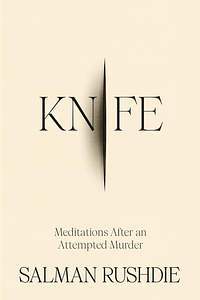You need to sign in or sign up before continuing.
Take a photo of a barcode or cover
dark
hopeful
reflective
sad
medium-paced
emotional
hopeful
reflective
medium-paced
Graphic: Violence
Moderate: Hate crime, Medical content, Religious bigotry, Murder
dark
emotional
hopeful
informative
inspiring
reflective
medium-paced
Plain-spoken, engaging, and some very memorable passages - the way the author wrote about the moments before his stabbing made me gasp, and I was moved by his reflections on words as knives and answering violence with art.
challenging
emotional
hopeful
reflective
medium-paced
informative
reflective
medium-paced
“…and this is the wonder that’s keeping the stars apart. i carry your heart(i carry it in my heart)” always good to get a surprise dose of ee :,,)
hopeful
informative
reflective
medium-paced
"Killing with a knife is very personal; you actually are holding it as it goes in, and when death comes, you can feel your victim dying through the knife."
Rushdie writes viscerally, if briefly, about his intimate 27-second brush with a would-be killer on August 12th, 2022, and he writes beautifully about love and grief, and he writes humorously about the ridiculousness of it all. In this fairly tight, personal, sometimes philosophical response to violence, a violence that was intended to silence.
“Art is not a luxury. It stands at the essence of our humanity, and it asks for no special protection except the right to exist.”
Rushdie touches on ideas of public versus private selves, on misinformation, on literary merits, on free speech - all of which are very much themes he has spent much time and ink on in the past, but here it is done more plainly and directly than I think he has previously. I think his personal story and his points benefit from the brevity of the fairly short book. I also really appreciate how he decided to deal with the attacker as a non-character, the conversation he manufactured being far more interesting, thought provoking, and funny than it could have possibly been in reality - AND it provided for some of the most cutting lines Rushdie has in the book, something he excels at. Rushdie owns his story here, he laments having to have this as part of his story and perhaps even more so the impact it has had, and continues to have, on his loved ones. In this memoir, Rushdie is still his typical darkly-humorous and bitingly-critical self, but he also seems to be emanating quite a bit of hope, which was a refreshing surprise to me.
Rushdie writes viscerally, if briefly, about his intimate 27-second brush with a would-be killer on August 12th, 2022, and he writes beautifully about love and grief, and he writes humorously about the ridiculousness of it all. In this fairly tight, personal, sometimes philosophical response to violence, a violence that was intended to silence.
“Art is not a luxury. It stands at the essence of our humanity, and it asks for no special protection except the right to exist.”
Rushdie touches on ideas of public versus private selves, on misinformation, on literary merits, on free speech - all of which are very much themes he has spent much time and ink on in the past, but here it is done more plainly and directly than I think he has previously. I think his personal story and his points benefit from the brevity of the fairly short book. I also really appreciate how he decided to deal with the attacker as a non-character, the conversation he manufactured being far more interesting, thought provoking, and funny than it could have possibly been in reality - AND it provided for some of the most cutting lines Rushdie has in the book, something he excels at. Rushdie owns his story here, he laments having to have this as part of his story and perhaps even more so the impact it has had, and continues to have, on his loved ones. In this memoir, Rushdie is still his typical darkly-humorous and bitingly-critical self, but he also seems to be emanating quite a bit of hope, which was a refreshing surprise to me.
“This is who we are as a species: We contain within ourselves both the possibility of murdering an old stranger for almost no reason—the capacity in Shakespeare’s Iago which Coleridge called “motiveless Malignity”—and we also contain the antidote to that disease—courage, selflessness, the willingness to risk oneself to help that old stranger lying on the ground.”
reflective
medium-paced
I feel like he’d be fun to gossip with




